 W
WHenri Alleg, born Harry John Salem, was a French-Algerian journalist, director of the Alger républicain newspaper, and a member of the French Communist Party. After Editions de Minuit, a French publishing house, released his memoir La Question in 1958, Alleg gained international recognition for his stance against torture, specifically within the context of the Algerian War (1954–1962).
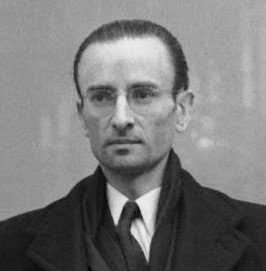 W
WPaul Bacon was a French politician.
 W
WJean Berthoin was a French politician.
 W
WPierre Armand Gaston Billotte was a French Army officer and politician. He was the son of General Gaston Billotte, who commanded parts of the French Army at the start of World War II. Pierre Billotte was himself notable for his combat actions during the Battle of France.
 W
WMaurice Jean Marie Bourgès-Maunoury was a French Radical politician who served as the Prime Minister in the Fourth Republic during 1957.
 W
WRobert Buron was a French politician and Minister of Finance from 20 January 1955 to 23 February 1955 and Minister of Public Works, Transport, and Tourism during Charles de Gaulle's third term from 9 June 1958 to 8 January 1959.
 W
WJacques Chaban-Delmas was a French Gaullist politician. He served as Prime Minister under Georges Pompidou from 1969 to 1972. He was the Mayor of Bordeaux from 1947 to 1995 and a deputy for the Gironde département between 1946 and 1997.
 W
WGeneral Édouard Corniglion-Molinier was an aviator and member of the French Resistance, a member of the French government during the French Fourth Republic, and, in the 1930-1940s, a movie producer. He was a friend of Marcel Dassault and a cousin of Fred Vidal.
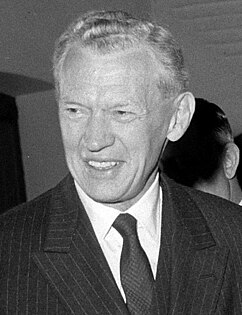 W
WJacques-Maurice Couve de Murville was a French diplomat and politician who was Minister of Foreign Affairs from 1958 to 1968 and Prime Minister from 1968 to 1969 under the presidency of General de Gaulle. As foreign minister He played the leading role in the critical Franco-German treaty of cooperation in 1963, He laid the foundation for the Paris-Bonn axis that was central in building a united Europe.
 W
WMichel Jean-Pierre Debré was the first Prime Minister of the French Fifth Republic. He is considered the "father" of the current Constitution of France. He served under President Charles de Gaulle from 1959 to 1962. In terms of political personality, he was intense and immovable, with a tendency to rhetorical extremism.
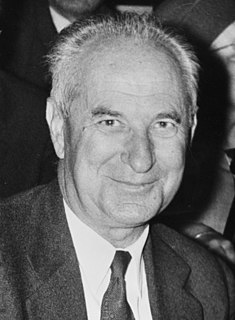 W
WGaston Defferre was a French Socialist politician. He served as mayor of Marseille for 33 years until his death in 1986. He was minister for overseas territories in Guy Mollet’s socialist government in 1956–1957. His main achievement was to establish the framework used to grant independence to France’s African territories. As the Socialist candidate for president in 1969, he received only 5 percent of the vote. He was much more successful in promoting François Mitterrand as leader of the Parti Socialiste in 1971. He held a series of ministerial portfolios after the Socialist victory in 1981, especially as minister of state for the interior and decentralization.
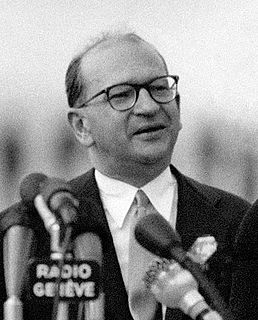 W
WEdgar Jean Faure was a French politician, lawyer, essayist, historian and memoirist who served as Prime Minister of France in 1952 and again between 1955 and 1956. Prior to his election to the National Assembly under the Fourth Republic for Jura in 1946, he was a member of the French Committee of National Liberation (CFLN) in Algiers (1943–1944). A Radical, Faure was married to writer Lucie Meyer. In 1978, he was elected to the Académie Française.
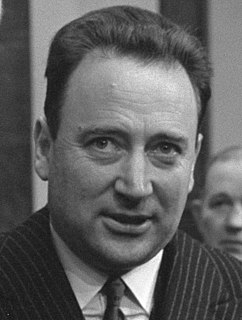 W
WMaurice Faure was a member of the French Resistance and a minister in several French governments. He was born in Azerat, Dordogne.
 W
WChristian Fouchet was a French politician.
 W
WRoger Frey was a French politician. His parents were of Alsatian origin. He was Minister of the Interior and president of the Constitutional Council of France.
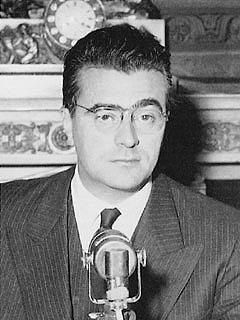 W
WFélix Gaillard d'Aimé was a French Radical politician who served as Prime Minister under the Fourth Republic from 1957 to 1958. He was the youngest head of a French government since Napoleon.
 W
WCharles André Joseph Marie de Gaulle was a French army officer and statesman who led Free France against Nazi Germany in World War II and chaired the Provisional Government of the French Republic from 1944 to 1946 in order to reestablish democracy in France. In 1958, he came out of retirement when appointed President of the Council of Ministers by President René Coty. He rewrote the Constitution of France and founded the Fifth Republic after approval by referendum. He was elected President of France later that year, a position to which he was reelected in 1965 and held until his resignation in 1969.
 W
WLouis Jacquinot was a French lawyer and politician, and chief of Prime Minister Raymond Poincaré's office.
 W
WJean-Marcel Jeanneney was a minister in various French governments in the 1950s and 1960s, and France's first ambassador to Algeria in the immediate aftermath of the Algerian War. Born in Paris, he has been a professor of economics and is the founder of the Observatoire Français des Conjonctures Economiques.
 W
WJean-Jacques Juglas, was a French politician.
 W
WMarie Joseph Pierre François Kœnig was a French general during the Second World War, where he commanded a Free French Brigade at the Battle of Bir Hakeim in North Africa in 1942. He started a political career after the War and was posthumously elevated to the dignity of Marshal of France in 1984.
 W
WGuy La Chambre was a French politician.
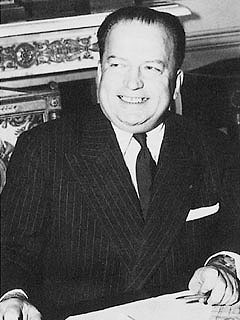 W
WRobert Lacoste was a French politician. He was a socialist MP of the Dordogne from 1945 to 1958, and from 1962 to 1967. He then served as senator from 1971 to 1980.
 W
WJean-Marie Le Pen is a French politician who served as President of the National Front from 1972 to 2011. He also served as Honorary President of the National Front from 2011 to 2015.
 W
WRobert Lecourt was a French politician and lawyer, judge and the fourth President of the European Court of Justice. He was born in Pavilly and died in Boulogne-Billancourt.
 W
WPierre Isaac Isidore Mendès France, known as PMF, was a French politician who served as President of the Council of Ministers for eight months from 1954 to 1955. He represented the Radical Party, and his government had the support of the Communist Party. His main priority was ending the war in Indochina, which had already cost 92,000 dead, 114,000 wounded and 28,000 captured on the French side. Public opinion polls showed that, in February 1954, only 7% of the French people wanted to continue the fight to regain Indochina out of the hands of the Communists, led by Ho Chi Minh and his Viet Minh movement. At the Geneva Conference of 1954 he negotiated a deal that gave the Viet Minh control of Vietnam north of the seventeenth parallel, and allowed him to pull out all French forces. The United States then provided large-scale financial, military and economic support to South Vietnam.
 W
WEdmond Michelet was a French politician. He is the father of the writer Claude Michelet.
 W
WFrançois Marie Adrien Maurice Mitterrand was a French statesman who served as President of France from 1981 to 1995, the longest time in office in the history of France. As First Secretary of the Socialist Party, he was the first left-wing politician to assume the presidency under the Fifth Republic.
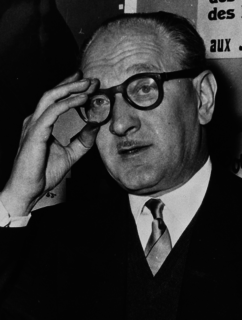 W
WGuy Alcide Mollet was a French politician. He led the socialist French Section of the Workers' International (SFIO) from 1946 to 1969 and was the French Prime Minister from 1956 to 1957.
 W
WÉmile Pelletier was a Minister of State for Monaco. He was in office from 1959 to 1962.
 W
WPierre Eugène Jean Pflimlin was a French Christian democratic politician who served as the Prime Minister of the Fourth Republic for a few weeks in 1958, before being replaced by Charles de Gaulle during the crisis of that year.
 W
WAntoine Pinay was a French conservative politician who served as Prime Minister of France from 1952 to 1953.
 W
WChristian Pineau was a noted French Resistance fighter, who later served an important term as Minister of Foreign Affairs from 1956 through 1958.
 W
WRené Pleven was a notable French politician of the Fourth Republic. A member of the Free French, he helped found the Democratic and Socialist Union of the Resistance (UDSR), a political party that was meant to be a successor to the wartime Resistance movement. He served as prime minister twice in the early 1950s, where his most notable contribution was the introduction of the Pleven Plan, which called for a European Defence Community between France, Italy, West Germany, and the Benelux countries.
 W
WPierre Sudreau was a French politician. His childhood correspondence with Antoine de Saint-Exupéry (1900–1944) helped inspire the title character of the 1943 novel The Little Prince.
 W
WFrançois Marie Tanguy Prigent was a French Socialist politician who became a resistance fighter during World War II (1939–45). He was Minister of Agriculture from September 1944 to October 1947 and was Minister of Veterans and War Victims from February 1956 to June 1957.
 W
WPierre-Henri Teitgen was a French lawyer, professor and politician. Teitgen was born in Rennes, Brittany. Made prisoner of war in 1940, he played a major role in the French Resistance.
 W
WRaymond Triboulet was a French politician. He was a leading World War II resistance fighter who helped U.S., Canadian, and British troops invade France, which was then occupied by Nazi Germany.
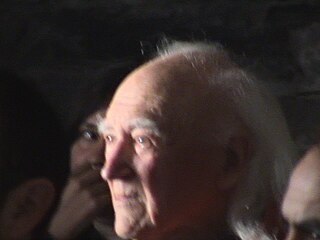 W
WRené Vautier was a French film director. His films, which were often controversial with French authorities, addressed many issues, such as the Algerian War, French colonialism in Africa, pollution, racism, women's rights, and apartheid in South Africa. Many were banned or condemned, and one caused him to go to prison for a year.